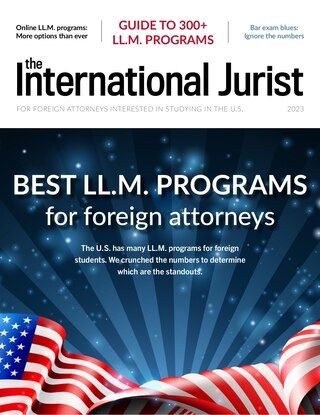By Desiree Jaeger-Fine
I am not aware of any country in which an LL.M. degree earned in the U.S. is required to practice law. The natural question then is: Why spend substantial amounts of time and money getting one? LL.M. tuition can run more than $50,000, not including fees, books, or living expenses like housing, food, transportation, cultural activities, etc.
So, pursuing the LL.M. is a major financial investment. And for those who do the LL.M. on a full-time basis, the study also represents a year of opportunity costs since studying full-time will eliminate or drastically reduce employment possibilities.
The legal landscape has changed dramatically in recent years, as well. Almost everywhere one can see news about the employment challenges facing law graduates in the U.S. but also in many other countries. Therefore, the question whether the LL.M. is worth pursuing is a critical one.
I believe that there are a variety of compelling reasons to get the U.S. LL.M degree. – and in some respects, it makes more sense now than ever before. Pursuing an LL.M. can benefit your career in ways much more dramatic than helping you to find a better entry-level job, and just looking at employment statistics doesn’t do the whole LLM experience justice.
Here are some reasons why doing an LL.M. in the U.S. is a valuable undertaking:
1. Earning an LL.M broadens your horizons
Studying abroad broadens your horizons, both personally and professionally. A lot of things are done differently in the US from your home country and you will find yourself asking: Is this a better way to do it?
You leave your comfort zone; you leave the place where most of your daily activity was done without even thinking about it. Now it takes you twice as much time to go grocery shopping, to send a package, to set up your utilities and buy a phone, to get an ID, to register for classes and exams, to find the right person to talk to, to access information of any kind.
It is difficult to explain how the most trivial things take so much longer in a country that you haven’t lived in before. You must break down walls every day. And this truly broadens your horizons and enhances your ability to deal with new situations in a variety of contexts. It may not seem this way at the start, but each of these little challenges helps you develop as a professional.
Problem-solving skills are easily transferable. Thriving while confronting the challenges of living in a foreign country is a good way to prove to prospective employers that you are adaptable and comfortable in new experiences and environments.
2. Earning an LL.M gives a global community
When you pursue a U.S. LL.M., you become part of a global community where you will meet and interact with law graduates from all over the world. I recently attended an LL.M. party in New York City. Within two hours, I met lawyers from Ghana, France, Italy, Denmark, Russia, China, Taiwan, Albania, Turkey, Mexico, Brazil, Germany, the US, and probably a few other countries that I can’t recall. I can’t think of another professional situation where you would interact so closely with so many people from so many different countries and legal cultures.
This is not only fun and exciting: It is challenging and rewarding. It forces you out of your comfort zone. It confronts you with cultural differences that you never imagined existed. It exposes you to different ways of doing things. It creates empathy and patience.
You become a more dynamic person in the process of creating friends. It gives you an appreciation for different legal systems and cultures. And, as discussed immediately below, it offers you an important professional network.
3. The LL.M. offers a valuable network of legal professionals
Each of your classmates is or will become a legal professional, and they will most likely be spread across the globe. Networking is something that becomes more and more important as the usual way of applying for jobs and doing business becomes more personal and interactive, and increasingly competitive.
Having a cross-border professional network of lawyers tied together by a common experience is worth a fortune. I know of people who cultivate and retain tremendous networks across the world. They get invited to the most beautiful places to attend conferences, participate in projects, give lectures – and even attend weddings and other family events.
These present professional (and personal!) opportunities that are widely overlooked. We tend to only look out for a “regular” job, but today, the “regular” approach to finding a job may not be adequate. We need to be much more creative and expansive. Using your LLM year as a way of advancing your professional circle is a way of maximizing your opportunities.
The network that you develop offers at least one other major advantage: The ability to attract employers by virtue of your vast base of contacts to call upon when you need counsel in another country – and who may call upon you when they need a lawyer in your jurisdiction. I have seen this sharing of business among former LLM classmates often, and this is a great selling point when seeking work in this increasingly competitive job market.
4. Studying a different legal system broadens your legal knowledge and perspectives
When you pursue an LL.M. in the US, you will, of course, develop a sophisticated and nuanced appreciation of the US legal system, US law, and the way in which a US lawyer would approach legal challenges. But the presence of classmates from around the world means that you will be exposed to many other different legal systems, different laws, and different approaches to legal questions. This exposure to different legal cultures is not only interesting but also very useful in helping you to better understand your own system.
This exposure forces you to think outside the box and to challenge assumptions that you once accepted without hesitation. This form of critical thinking is indispensable to becoming a top-quality lawyer prepared to handle global challenges.
5. The US LLM may qualify you to take a US bar and be admitted as a lawyer in an additional jurisdiction
Being admitted as a lawyer in a jurisdiction outside of your home country can be an excellent credential in a number of respects. First, it allows you to practice law in a different jurisdiction, which expands your career options. It also enhances your career prospects in other places. Admission to the New York State bar, for instance, is a highly respected credential in many places around the world, especially at multinational firms or when servicing U.S. clients. The U.S. LL.M. is the fastest way for law graduates from civil law jurisdictions to gain eligibility to sit for at least some U.S. state bar examinations.
6. Arguing and solving legal issues in a foreign language and a different legal environment improves self-confidence
Most LL.M. students in the US are not native English speakers and undertake the challenges of U.S. graduate legal education in a language not their own. And most of those students come from civil law countries and thus have the additional challenge of mastering a different legal system. These added challenges bring opportunities – opportunities to develop skills that you would never be able to acquire in your own language and legal culture.
One major opportunity is the chance to argue in English – the second (or third) language for many LL.M. candidates and the universal language of the international legal community. Words are the weapon of lawyers and having the ability to argue and persuade in a foreign language – especially in English – is an enormous professional advantage. The LLM offers extensive ability to practice doing this in English – practice in a safe environment that you would not find anywhere else.
This happens both inside and outside of the classroom: Inside the classroom, a dialogue between professors and students and among students is the norm, something that is not common in many other countries. This method of teaching, called the Socratic method, is intended to develop in students the ability to think critically – and quickly – and to express arguments in a cogent and convincing manner; these conversations often continue outside of the classroom as students continue to discuss points of interest raised in class. Much of the daily discourse around the U.S. law school community involves discussing your perspective on various legal issues, and it is this vibrancy that gives students essential training in the critically important skill of persuasion.
Desiree Jaeger-Fine is the new director of International Programs at Brooklyn Law School and author of “A Short & Happy Guide to Networking” (West Academic Publishing) and “A Short & Happy Guide to Being Hired” (West Academic Publishing).






